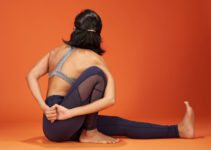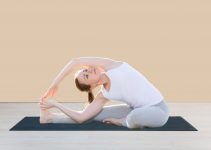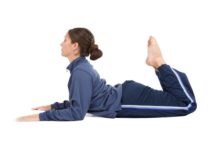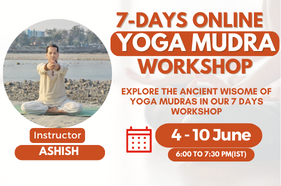- Yoga & Tinnitus
- Ear Pressure pose
- Cobra pose
- Crocodile pose
- Triangle pose
- Cow Face Pose
- Sukshma Vyayama
- Bhramari Pranayama
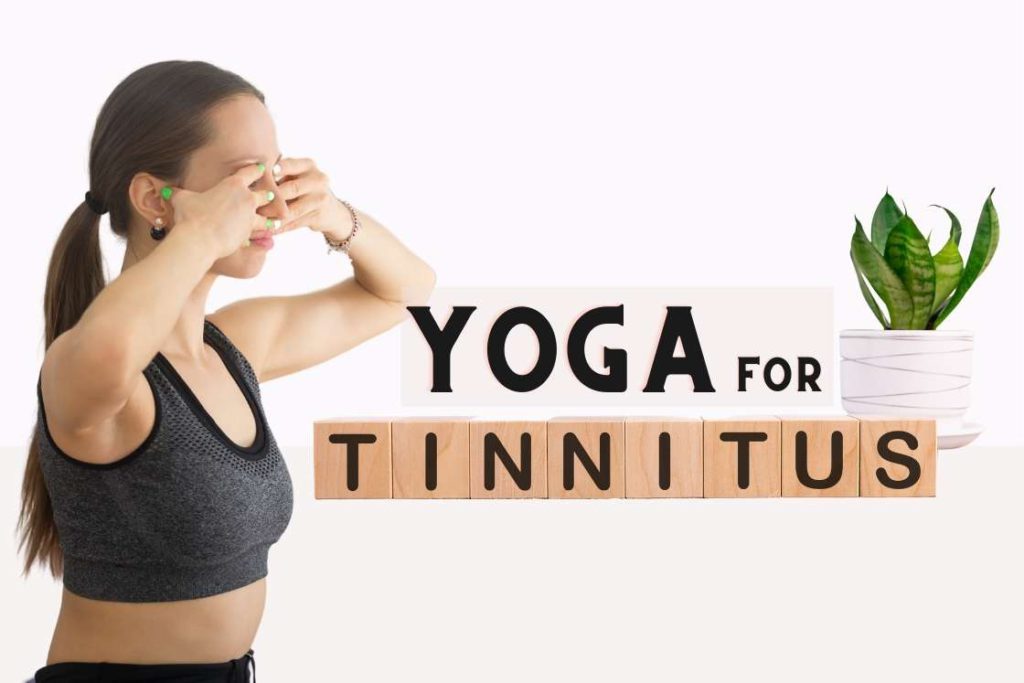
Tinnitus is the ringing of your ears, even when there is no ringing noise in reality. In the case of tinnitus, your brain creates the illusion of sound. The sound can vary from ringing to buzzing, hissing, roaring, and clicking.
A 2018 research study [efn_note] Köksoy S, Eti CM, Karataş M, Vayisoglu Y. The Effects of Yoga in Patients Suffering from Subjective Tinnitus. Int Arch Otorhinolaryngol. 2018;22(1):9-13. doi:10.1055/s-0037-1601415 [/efn_note] has shown that practicing yoga exercises once a week for a period of three months is effective in improving the symptoms of tinnitus. Yoga practices may reduce life stress and symptoms of subjective tinnitus in chronic patients to improve quality of life.
How can yoga benefit tinnitus?
The uniqueness of yoga over the other conventional exercises is the degree of involvement it brings to our awareness and senses. Tinnitus being mainly a problem of one of our senses, you will find benefits with yoga.
- Boosts cognition and awareness – Yoga training boosts cognition and awareness to improve the daily functioning of patients with chronic tinnitus.
- Stimulate auditory nerves – Some yoga poses like cobra pose, tree pose, and the downward-facing dog pose can help boost your entire nervous system, including your auditory nerves.
- Promotes relaxation – Yoga exercises like Bhramari Pranayama reduce symptoms of Tinnitus [efn_note] Sidheshwar Pandey, Niladri Kumar Mahato & Ravishankar Navale (2010) Role of self-induced sound therapy: Bhramari Pranayama in Tinnitus, Audiological Medicine, 8:3, 137-141, DOI: 10.3109/1651386X.2010.489694 [/efn_note] by acting as a source of self-generated sound, inducing parasympathetic predominance, and relaxing the auditory nerves.
- Clear infection – Yoga kriyas may help clear the infections from target specific areas of your body to relieve Tinnitus.
- Improve cardiovascular functions – Yoga maintains blood circulation which may decrease blood pressure on your ear vessels, leading to less chance of tinnitus.
Yoga Exercises for Tinnitus
The yoga poses, along with a couple of Pranayama practices will help you activate the chakras associated with your auditory system. The yoga exercise will include a dynamic range of body stretches, activation of pressure points, regulation of blood flow, and systematic breathing. These processes collectively will help you resolve tinnitus.
Practices these yoga asanas to relief Tinnitus.
1. Ear Pressure Pose – Karnapidasana
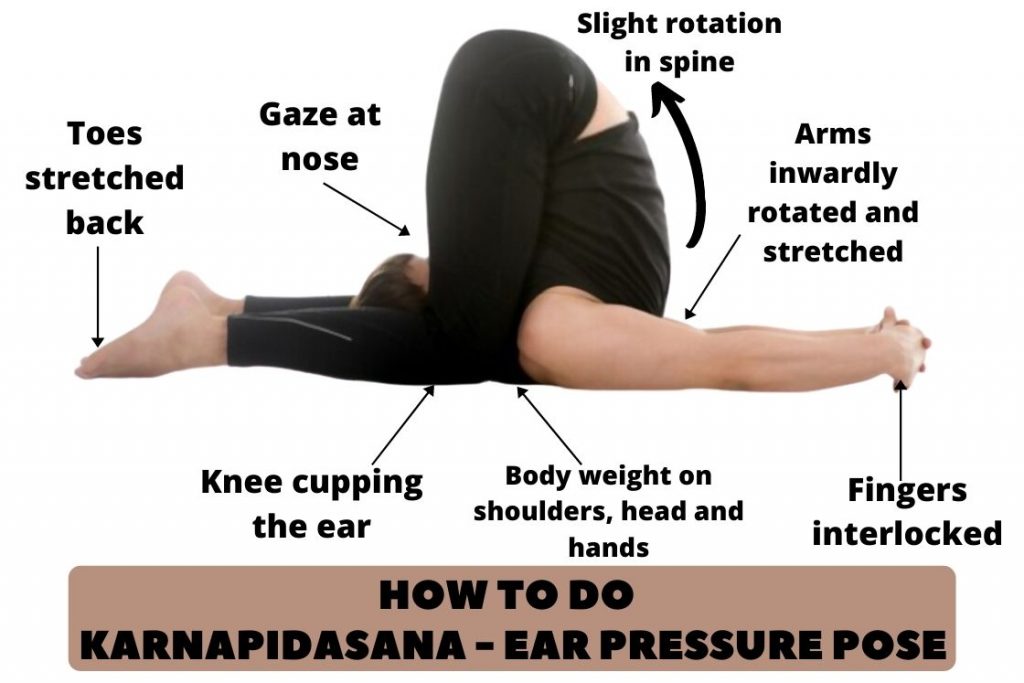
As the name suggests, this pose stretches your spine to maintain balanced pressure in your ears. Karnapidasana will also aid in mending damaged auditory nerves. This pose also helps with rejuvenating ear fluids and warding off ear infections.
If your ears continuously rings, then perform Karnapidasana to relief.
- First get into Sarvangasana.
- Then gradually use your core to gradually bring your legs down, with each exhalation, to a plow pose.
- Hold your pose in plow pose for a few seconds; around 10 seconds.
- Adjust your pelvis for a comfortable and proper posture. Your upper body should remain vertical on your shoulders.
- Now gradually bend one knee at a time, and bring down your knees to press them against your ears.
- Hold in karnapidasana for 5 breaths, and release back to plow pose and then to Sarvangasana, and release.
This pose will need prior lower back Flexibility and core strength. You can practice a few varieties of crunches and planks for the core, and few back stretches for lower back Flexibility. This pose is definitely not a beginner level pose, but the benefits to tinnitus make it really worth the effort.
2. Cobra Pose – Bhujangasana
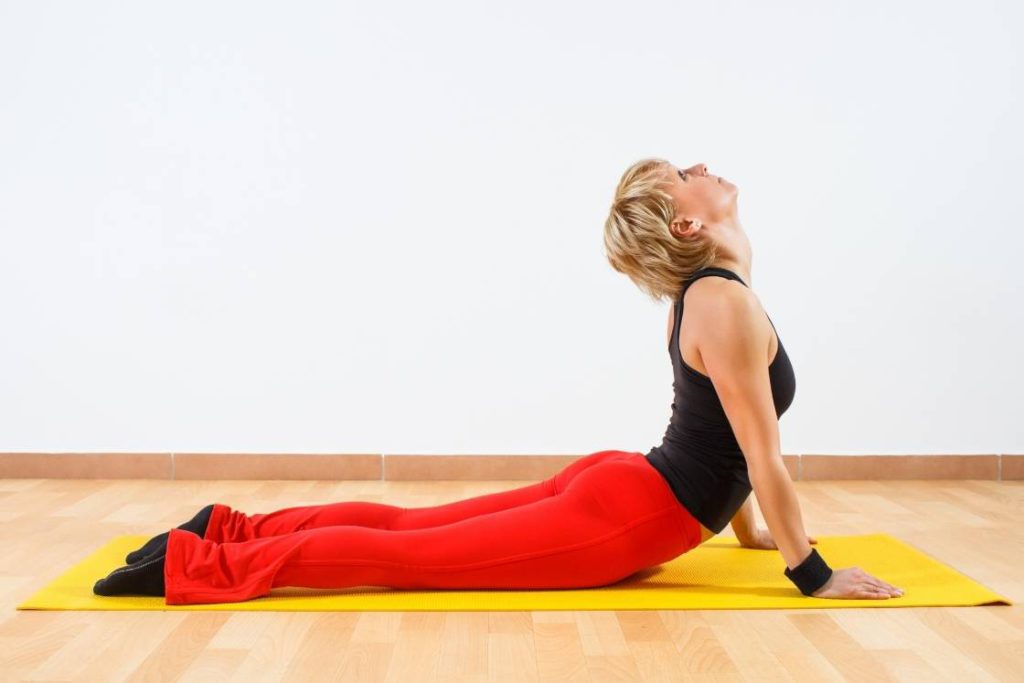
Bhujangasana is the yoga on the list that will take care of your complete nervous functions, including hearing problems. The stretch in Bhujangasana superbly opens up each vertebrae in your spine. This stretch, apart from increasing your spine flexibility, will also establish efficiency in your nervous network. The cobra pose is also beneficial to your cognition.
- Lie on the floor, on your front, with your hands by the sides of your chest. Keep your palm facing against the floor.
- Keep your legs joined and your toes stretched out.
- Now press against the floor with your hands and knees, and arch your spine upwards to pull up your body.
- Make sure the arch is not just in your lower spine, but in your upper spine as well.
- Use your abs consciously to press against each part of the spine, and arch it backwards.
- The conscious arching will also provide therapeutic relief to your spine.
- Finally, you can keep your head straight, looking forward, or gently arch it backwards.
- In case of tinnitus, arching your head backwards alongwith the rest of the spine will prove beneficial.
Pushing against the floor and the pull of the arch, will naturally lift your pelvis off the floor, but you must resist. You will have to consciously keep your pelvis touched to the ground.
3. Crocodile pose – Makarasana
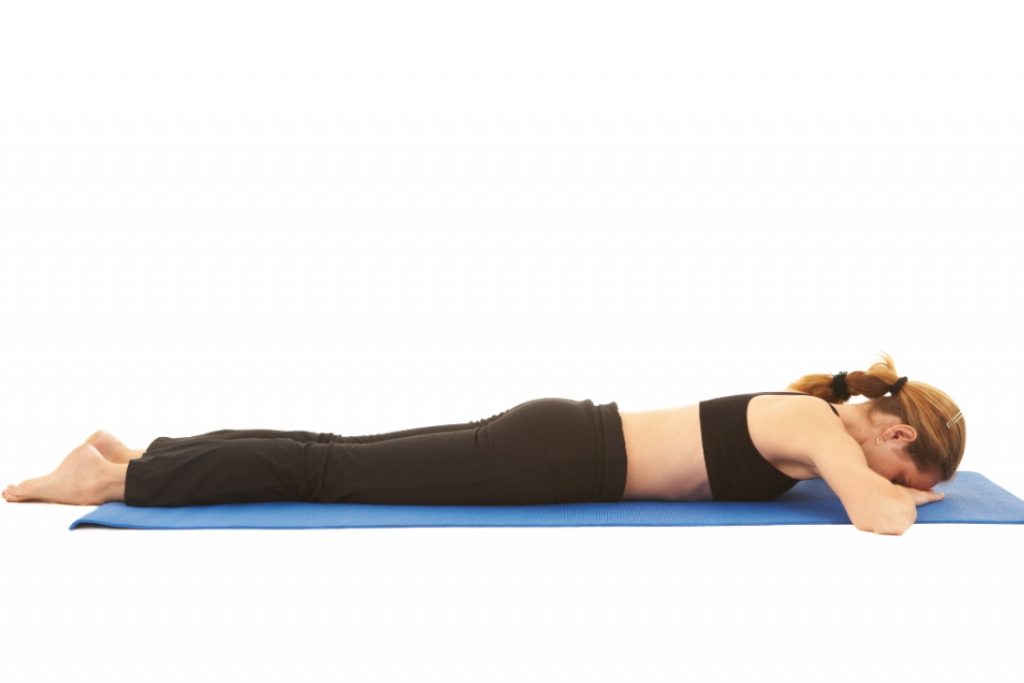
Makarasana is a relaxing pose for your ear nerves. It can bring balance between both of your ears. And finally, the crocodile pose can effectively clear your ear canals of blockages, including ear fluids and ear wax. The resting nature of the pose can also help you deal with the frustration associated with chronic tinnitus.
- Makarasana is an absolute delight to perform.
- All you got to do is simply lie on the floor on the front of your body, your belly.
- Lift up your chest to head.
- Fold your hands from your elbows, and rest your head, by resting your chin on the palm of your hands.
- Breathe steadily, and bend your knees, one at a time and pull your foot towards your buttock.
- Alternatively, for added Benefit in tinnitus, try a variation of this pose.
- First you lie on your front and turn your head to the left.
- Then you place your right arm under your head with your palm facing the ground, and rest your head, turned to the left, on the back of your palm.
- Now bend your right leg, and bring the knee up to your hip length.
- Bend your left hand and rest it by the side of your head, and keep your left leg straight.
- Breathe steadily.
- After a comfortable duration, perform the pose on the other side
You can do both variations as well. Makarasana is also a good pose to take a nap. When taking small breaks between work or a busy schedule, take quick power naps in makarasana. However, do not practice this with a belly full of food.
4. Triangle Pose – Trikonasana
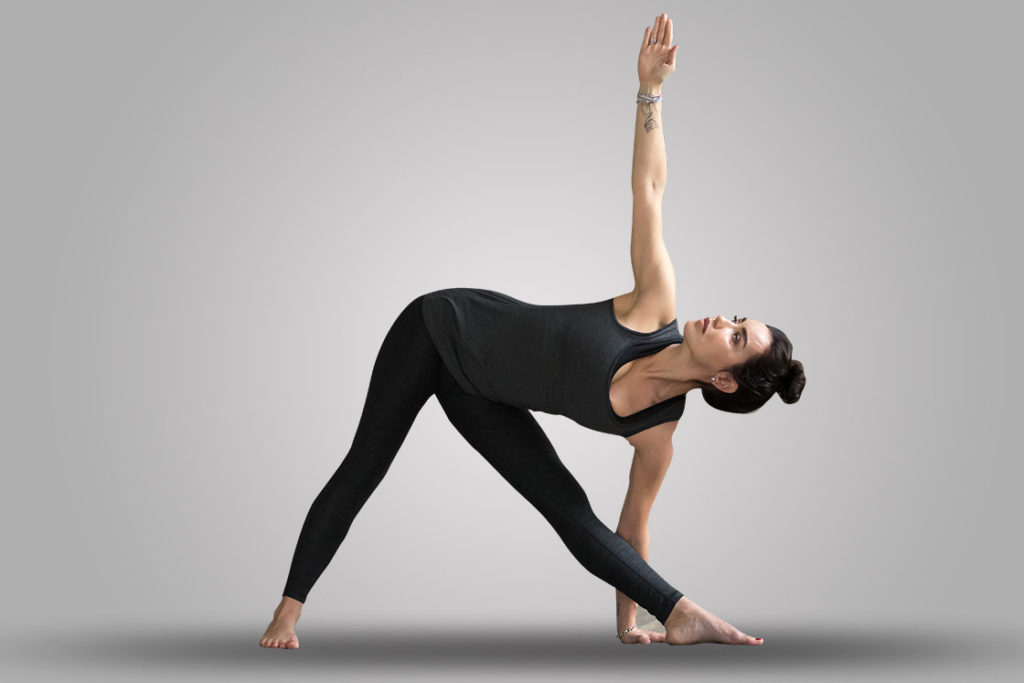
Trikonasana pumps fresh blood up the vessels in your head and ear. This can instantly pull you out of the illusion of the ringing noise. A healthy blood flow will also enhance your overall auditory functioning. Trikonasana also involves a bend-and-twist posture of the spine, that stimulates nervous activities.
- Stand with your legs wide spread. Maintain a gap of 2-3 feet, depending on your height and leg length.
- Raise your hands at the sides of your body.
- Now turn your left foot to your left, revolving your toe with heel fixed, by 90 degrees.
- Turn your right foot as well, to your left in similar manner, but only by 30-45 degrees.
- Facing forward, bend to your left so that the tip of your left hand touches your left foot.
- You will feel a slight twist in your abdomen.
- Point your right hand upwards, keeping in the same line of your left hand.
- Look towards your right hand.
- Hold the pose for 10 seconds and repeat on the other side.
While bending for your foot, don’t force yourself down. Let your body gradually develop the flexibility. Especially do not forcefully extend your arms to touch your foot. It serves no purpose; the bend in your body is the main goal. As preparatory poses, you can try forward bend and wide-legged forward bend.
5. Cow Face Pose – Gomukhasana
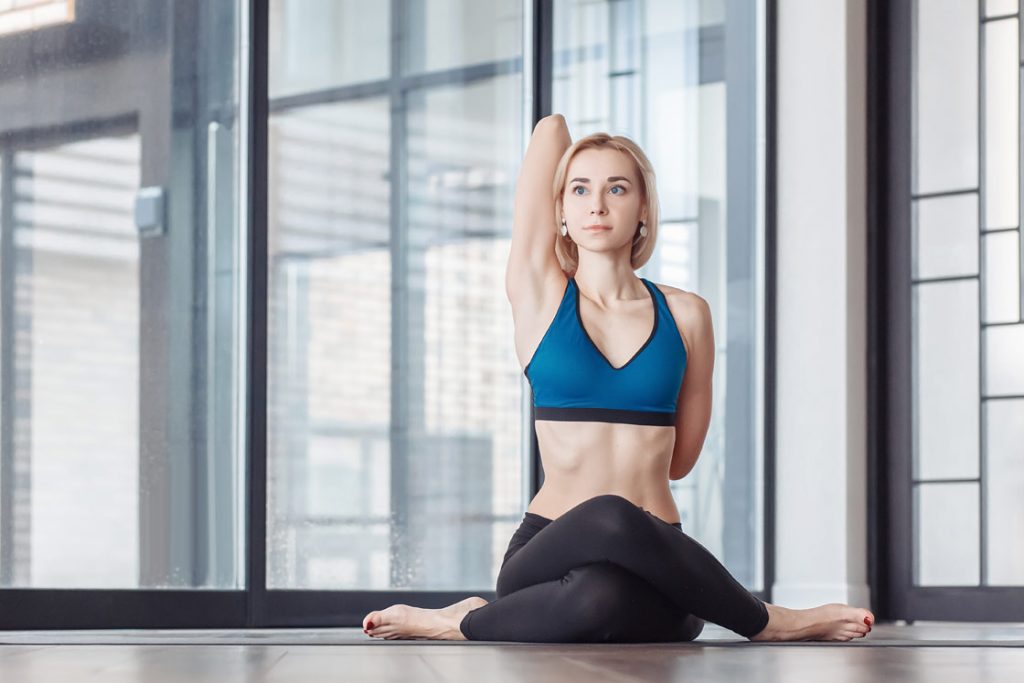
Gomukhasana boosts your overall blood-circulation. An improved blood circulation keeps all your organs healthy for aggregate physical well being. This pose has a very positive influence on your throat, which often acts as the gateway to your head. Practicing this pose daily can eventually relieve tinnitus.
- Sit in a staff position, with your legs stretched straight Infront of you.
- Bend your right leg and lift up your knee.
- Bend your left leg and bring the left foot from under your right leg, and put it under your right buttock.
- Put your right leg over your left leg, such that both knees stack up against each other.
- Press the right foot against your left buttock.
- Sit with your spine and head straight.
- Now lift your right hand and take it behind, between your shoulder blades, whilst, taking your left hand behind from the side of your left abdomen, and clasp both your hands together between your shoulder blades.
- Hold the position for 15-30 seconds, and repeat the exercise on the other side.
Note: This pose will require some flexibility of your shoulder and tricep muscles. As a preparatory pose to increase shoulder and tricep flexibility, you can practice seated garudasana and upward plank.
6. Sukshma Vyayama Kriya for Ears
Sukshma Vyayama Kriya, in yoga, is specifically designed for ENT purposes. Thus, this practice is a must if you are suffering from tinnitus. This Vyayama opens up and activates your middle ear. It also clears mucus in the middle ear and nasopharynx, thus effectively preventing certain infections. This process also includes active participation of the eustachian tube that connects your middle ear and nasopharynx.
- Sit in sukhasana.
- Join your palms, fingers spreading apart. Now unjoin your palms, except the tip of your fingers.
- Close your nostrils with your thumbs, slightly lift up your head and take a deep breath in through your mouth.
- Inhale so deep, that it fills up your abdomen, chest, and mouth. Distribute this air pressure evenly in your mouth, nose, and ears.
- Tuck in your chin, tilt your head down so that your little fingers touch the middle of your chest.
- Hold this Vyayama for about 15 seconds and release.
- You can do this Vyayama for 3 repetitions.
This Vyayama will also increase your capacity to inhale, and improve the strength of your respiratory and cardiovascular muscles.
7. Bhramari Pranayama
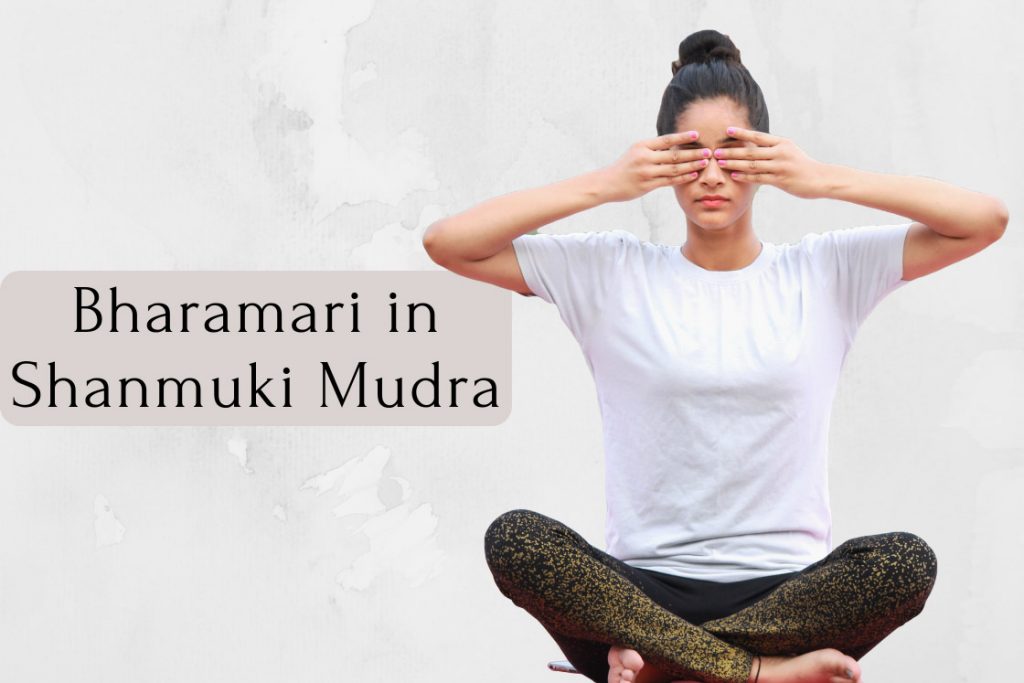
When it comes to Bhramari Pranayama, there are specific research studies that elaborate on the benefits. Bhramari Pranayama creates vibration and distributes it evenly, through all five senses. The shanmukhi mudra used in Bhramari helps to intensify these vibrations, along all sensory pathways. Your auditory canals and nerves, receive these vibrations and resolve the issue of tinnitus.
- Sit in sukhasana.
- Close your eyes.
- Place your little fingers below your lower lip, your ring fingers over your upper lip, your middle fingers over your nose bridge, index finger over your eyes, and thumbs in your ears.
- Inhale moderately and exhale with a humming bee like sound.
- Do the humming exhalation, only for a duration that you can do without stressing your face.
- Do it for 10 repetitions.
The humming bee like sound is supposed to be created at the back of your mouth, rather than Infront. And the vibration should have more of a contained nature than forceful.
Should you be worried about tinnitus?
Firstly, you have to understand tinnitus occurs for a great many reasons. It can even occur from something as minor as ear wax. Most of the time having your ears ringing for a few seconds, once in a while, is not a matter of concern.
However, if it lasts for hours and occurs frequently, it could be a matter of concern. In such cases, it could indicate an underlying condition such as severe nerve injury or come as a precursor to hearing loss.
Conclusion
Remember, that the poses are always better practiced under the supervision of an experienced practitioner. Initially you will have low body awareness, hence it will be difficult for you to visualize the posture your body is forming. A trained eye will help you give better insights.
Additionally, these poses should not ideally be your only solution. You must figure out the underlying cause, and address it with necessary diet and medication. If you do have a chronic underlying cause, such as a cardiovascular disorder, you will also need to practice yoga poses specific to that disorder.
